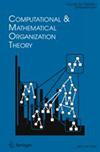Making futures that matter: Future making, online working and organizing remotely
IF 1.5
4区 管理学
Q3 COMPUTER SCIENCE, INTERDISCIPLINARY APPLICATIONS
Computational and Mathematical Organization Theory
Pub Date : 2022-01-01
DOI:10.1177/26317877211069138
引用次数: 6
Abstract
Future making is the work of making sense of possible and probable futures, and evaluating, negotiating and giving form to preferred ones. Practices of making futures are increasingly online. Yet, as organizational participants come together online – organizing remotely to make offline futures – they lack the shared experiential knowledge that is gained through embodied and situated practices. In this essay, we argue that the lack of experiential knowledge makes future making online difficult to organize and vulnerable to excluding relevant expertise; dialogue may become inward-looking and self-referential within the online environment, with an emotional and cognitive distance from the futures being made outside of such representations. We draw on the pragmatist tradition to theorize online future making, to articulate its dynamics and the challenges that arise, and to suggest remedial actions. By conceptualizing future making as a form of inquiry – as a distributed and reflective process that proceeds through engagement with representations of the future – we identify three remedial actions for online future making: to solicit feedback, juxtapose alternatives and change medium. These remedial actions seek to compensate for the lack of shared experiential knowledge by both sustaining the online involvement of heterogeneous remote participants and by bringing in relevant (offline) places, people and materials to online future making.创造有意义的未来:创造未来、在线工作和远程组织
未来规划是对可能的和可能的未来进行理解,并评估、协商和形成首选未来的工作。期货交易越来越多地在网上进行。然而,当组织参与者在网上聚集在一起——远程组织以创造线下的未来——他们缺乏通过具体化和情境实践获得的共享经验知识。在本文中,我们认为经验知识的缺乏使未来在线制作难以组织,容易排除相关专业知识;在网络环境中,对话可能会变得内向和自我参照,在情感和认知上与这种表现之外的未来保持距离。我们借鉴实用主义的传统,理论化在线未来的制定,阐明其动态和出现的挑战,并建议补救措施。通过将未来制作概念化为一种探究形式——作为一种通过参与未来的表征而进行的分布式和反思过程——我们确定了在线未来制作的三种补救措施:征求反馈、并列选择和改变媒介。这些补救行动试图通过维持异构远程参与者的在线参与以及通过将相关(离线)地点、人员和材料引入在线未来制定来弥补共享经验知识的缺乏。
本文章由计算机程序翻译,如有差异,请以英文原文为准。
求助全文
约1分钟内获得全文
求助全文
来源期刊

Computational and Mathematical Organization Theory
COMPUTER SCIENCE, INTERDISCIPLINARY APPLICATIONS-MATHEMATICS, INTERDISCIPLINARY APPLICATIONS
CiteScore
3.80
自引率
16.70%
发文量
14
审稿时长
>12 weeks
期刊介绍:
Computational and Mathematical Organization Theory provides an international forum for interdisciplinary research that combines computation, organizations and society. The goal is to advance the state of science in formal reasoning, analysis, and system building drawing on and encouraging advances in areas at the confluence of social networks, artificial intelligence, complexity, machine learning, sociology, business, political science, economics, and operations research. The papers in this journal will lead to the development of newtheories that explain and predict the behaviour of complex adaptive systems, new computational models and technologies that are responsible to society, business, policy, and law, new methods for integrating data, computational models, analysis and visualization techniques.
Various types of papers and underlying research are welcome. Papers presenting, validating, or applying models and/or computational techniques, new algorithms, dynamic metrics for networks and complex systems and papers comparing, contrasting and docking computational models are strongly encouraged. Both applied and theoretical work is strongly encouraged. The editors encourage theoretical research on fundamental principles of social behaviour such as coordination, cooperation, evolution, and destabilization. The editors encourage applied research representing actual organizational or policy problems that can be addressed using computational tools. Work related to fundamental concepts, corporate, military or intelligence issues are welcome.
 求助内容:
求助内容: 应助结果提醒方式:
应助结果提醒方式:


